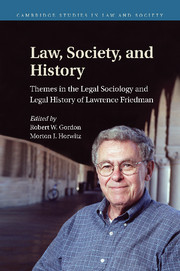Book contents
- Frontmatter
- Contents
- Contributors
- Introduction
- PART I OVERVIEWS AND ASSESSMENTS OF FRIEDMAN'S WORK
- 1 Lawrence Friedman and the Canons of Law and Society
- 2 “Then and Now”
- 3 Lawrence Friedman and the Bane of Functionalism
- 4 Lawrence M. Friedman's Comparative Law
- PART II APPLICATIONS OF CONCEPTS, INSIGHTS, AND METHODS IN FRIEDMAN'S WORK
- PART III THE LEGAL PROFESSION
- PART IV LAW AND LARGE AREAS OF SOCIAL LIFE
- PART V FACTS FROM THE UNDERGROUND: DIGGING LEGAL HISTORY OUT OF THE CELLAR
- PART VI PERSPECTIVES FROM OTHER CONCEPTUAL WORLDS
- Index
- Titles in the series
- References
3 - Lawrence Friedman and the Bane of Functionalism
Published online by Cambridge University Press: 07 October 2011
- Frontmatter
- Contents
- Contributors
- Introduction
- PART I OVERVIEWS AND ASSESSMENTS OF FRIEDMAN'S WORK
- 1 Lawrence Friedman and the Canons of Law and Society
- 2 “Then and Now”
- 3 Lawrence Friedman and the Bane of Functionalism
- 4 Lawrence M. Friedman's Comparative Law
- PART II APPLICATIONS OF CONCEPTS, INSIGHTS, AND METHODS IN FRIEDMAN'S WORK
- PART III THE LEGAL PROFESSION
- PART IV LAW AND LARGE AREAS OF SOCIAL LIFE
- PART V FACTS FROM THE UNDERGROUND: DIGGING LEGAL HISTORY OUT OF THE CELLAR
- PART VI PERSPECTIVES FROM OTHER CONCEPTUAL WORLDS
- Index
- Titles in the series
- References
Summary
My aims in this chapter are modest. The first is to provide an overview of the corpus of Lawrence Friedman's scholarship. The second is to distill one or two of the essential ideas and themes that in my view emerge from Friedman's work and from his engagement with other historians. One recursive theme is the way that, for Friedman, theory and method are intellectually fused. It is difficult, if not impossible, to separate Friedman's theoretical insights into law and society and legal change from his methodology, his reliance on and analysis of trial court cases, and his use of individual stories to talk about the down-on-the ground meaning of law. This fusion of ideas and method positions Friedman intellectually within the legal history community and within legal scholarship more generally. That observation leads to the second theme I want to identify: the way in which Friedman has come to represent, sometimes all by himself, one clearly demarcated side of an ongoing argument raging among those who seek to get inside the heads of nineteenth-century judges. To explore this theme, I map the interesting fruits of a relatively recent exchange between Friedman and the author of a book with which he took issue, an exchange that both recapitulates and moves forward a dialogue Friedman began more than forty years ago.
- Type
- Chapter
- Information
- Law, Society, and HistoryThemes in the Legal Sociology and Legal History of Lawrence M. Friedman, pp. 43 - 51Publisher: Cambridge University PressPrint publication year: 2011

